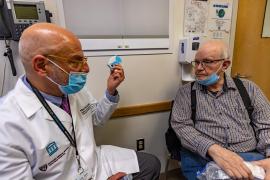At UNGASS, Nations Adopt Final Declaration
U.N. member nations attending the U.N. General Assembly Special Session on HIV/AIDS in New York City on Friday after "difficult" negotiations reached a compromise on a final declaration to address the HIV/AIDS pandemic, the Washington Post reports (Brown, Washington Post, 6/3). The three-day meeting aimed to update a 2001 declaration that provided the framework for a worldwide campaign to fight HIV/AIDS. The 2001 declaration laid out several goals, including the specific amount of money that should be spent on HIV/AIDS in developing countries in 2005, the percentage of pregnant women who should be receiving drugs to prevent mother-to-child transmission of HIV and the percentage of HIV-positive people with advanced stages of the disease who should be receiving antiretroviral drugs. Most of the goals in the 2001 declaration were not met, but a goal to spend $8.3 billion on HIV/AIDS in developing nations was reached. The declaration is not a binding document (Kaiser Daily HIV/AIDS Report, 6/2). The new declaration is a "political blueprint, not a plan of action," on how to combat the pandemic, according to the New York Times.
Declaration Text
According to the final document, countries should use scientifically documented prevention strategies, including access to condoms; make clean needles accessible to injection drug users; and move forward in their efforts to provide universal access to HIV prevention programs, antiretroviral drugs and medical care, the Times reports (Altman/Rosenthal, New York Times, 6/3). The declaration acknowledges the importance of "harm-reduction efforts related to drug use" -- in reference to needle-exchange programs -- but does not include reference to "substitution therapies," such as methadone, which many groups had urged for opiate addiction, according to the Post. The declaration also makes reference to "male and female condoms" as a prevention method (Washington Post, 6/3). Although rights for girls and women were subjects of dispute during the discussions, the 2006 declaration "notably contain[s] fresh" language to empower women in regard to their sexual and reproductive health, "free of coercion, discrimination and violence," AFP/ChannelNews Asia.com reports (AFP/ChannelNews Asia.com, 6/2). The declaration acknowledges the "feminization" of the pandemic and also recognizes the importance of increasing HIV/AIDS awareness among young people and the need for drugs formulated for children (Washington Post, 6/3). The declaration also says that annual funding for HIV/AIDS must increase from $8 billion to between $20 billion and $23 billion by 2010 and calls for "ambitious national targets" to be set for 2006, including interim targets for 2008, Xhinuanet reports (Xhinuanet, 6/3). The document does not commit donors or recipient countries to provide that amount (Washington Post, 6/3). According to UNAIDS, $8.9 billion is expected to be available in 2006 to fight HIV/AIDS in developing countries, short of the $14.9 billion that is needed. The agency also projects that the need for resources will rise to $22.1 billion by 2008, including $11.4 billion for prevention (Kaiser Daily HIV/AIDS Report, 6/1). The document does not provide clinical targets regarding how many HIV-positive people should be treated, the Post reports. The eight-page document is a compromise between the U.S., which opposed "numerical treatment targets"; Islamic countries, which did not want the term "vulnerable populations" defined in the text; and many nongovernmental and HIV/AIDS advocacy organizations that urged more reproductive rights for women to help them protect themselves against HIV/AIDS, the Post reports (Washington Post, 6/3).
Reaction to Declaration
Mark Dybul, acting U.S. Global AIDS Coordinator, said he had not seen any weak points in the "fine declaration." International Women's Health Coalition President Adrienne Germain said the declaration could be used "to make significant progress in going forward" to curb the pandemic (New York Times, 6/3). However, the final declaration was "condemned as blinkered and ineffective" by some NGOs and HIV/AIDS advocates attending the meeting, AFP/News Asia.com reports (AFP/ChannelNews Asia.com, 6/2). Stephen Lewis, U.N. special envoy for HIV/AIDS in Africa, said, "The absence of the financial targets distresses me," adding, "What I run into everywhere in Africa is a very great anxiety on the part of governments about whether they're able to sustain the financing. And they just don't feel that they have a reliable commitment" (McCarthy, Globe and Mail, 6/2). Aditi Sharma, HIV/AIDS campaign and policy coordinator for ActionAid International, said, "It is incomprehensible how negotiators could come up with such a weak declaration when we needed urgent action to stop 8,500 people dying and 13,500 people from becoming infected every day" (AFP/ChannelNews Asia.com, 6/2). "Once more we are disappointed at the failure to demonstrate real political leadership in the fight against the pandemic," the Rev. Njongonkulu Ndungane, the Anglican Archbishop of Capetown, South Africa, said, adding, "Even at this late stage, we call on the world's political leaders to rise up and meet the challenges that the pandemic presents and to set ambitious targets at a national level to guarantee universal access to treatment, care, support and prevention" (Center for Health and Gender Equity release, 6/2). "I know that none of you got all that you wanted in this declaration," U.N. General Assembly President Jan Eliasson said in closing the session, adding that the "draft got stronger -- not weaker" as a result of the advocacy groups' contributions (Leopold, Reuters UK, 6/3). UNAIDS Executive Director Peter Piot encouraged U.N. member nations to adopt the final draft of the declaration, saying it would "take us to the next stage in the fight against AIDS," adding, "Even though we may have differences of tactics, as was clear this week, we are all a critical piece of the same strategy" (AFP/ChannelNews Asia.com, 6/2). Piot said that the final version was a "major advance" from previous drafts earlier in the week (New York Times, 6/3).
U.N. Secretary-General Criticizes Some Parts of Declaration, Political Leadership
U.N. Secretary-General Kofi Annan on Friday at the close of the special session "delivered a gloomy assessment" of global efforts to curb the spread of HIV/AIDS, the Times reports (New York Times, 6/3). "The epidemic continues to outpace us," Annan said, adding, "Last year, globally, there were more new infections than ever before, and more people died than ever before" (Wadhams, AP/Houston Chronicle, 6/2). He added that if countries do not "step up the fight drastically," the world will not be able to "reverse the tide" against the pandemic (International Herald Tribune, 6/3). Annan also criticized nations for not addressing high-risk groups -- such as IDUs, commercial sex workers and men who have sex with men -- more specifically in the declaration. Annan said, "You cannot deal with a problem without confronting the issue of the most vulnerable who need assistance most. It's counterproductive" (BBC News, 6/3).
U.S. First Lady Calls for International HIV Testing Day, Increased HIV Education
U.S. first lady Laura Bush, speaking on Friday at the special session, called on nations to adopt an International HIV Testing Day and to be more open about the effects and risks of HIV/AIDS, the New York Daily News reports (Shin, New York Daily News, 6/3). Bush said, "Fighting [HIV/]AIDS is an urgent calling -- because every life, in every land, has value and dignity" (Pisik, Washington Times, 6/3). Bush also said, "[E]very country has an obligation to educate its citizens," adding, "This is why every country must also improve literacy, especially for women and girls, so they can learn to make wise choices that will keep them healthy and safe." In addition, Bush said that education is "spreading hope" and that the ABC model -- which stands for abstain, be faithful and use condoms -- has been very effective in many countries. Bush also promoted the President's Emergency Plan for AIDS Relief and said some of the funds would be dedicated to train "community health workers" in African villages (Wadhams, AP/Wichita Eagle, 6/2).
14 Nations Announce Airline Ticket Tax To Fund HIV/AIDS Programs
Fourteen nations led by France on Friday at the special session announced a plan to impose a tax on airline tickets as a means of providing funds to increase access to HIV/AIDS drugs for people in developing countries, the Los Angeles Times reports. Brazil, Chile, Congo, Cote d'Ivoire, Cyprus, France, Gabon, Jordan, Luxembourg, Madagascar, Mauritius, Nicaragua, Norway and the United Kingdom have agreed to impose the tax, which is expected to raise more than $258.3 million annually. The countries plan to use the funds to purchase antiretroviral drugs in bulk to help reduce the costs, and to provide drug companies with incentives to manufacture more pediatric drugs, according to the Times. The U.S. opposes the tax, according to the Times (Farley, Los Angeles Times, 6/3).
Caribbean Countries Call for Revision of Global Fund Eligibility Criteria
St. Kitts and Nevis Prime Minister and Chair of the Pan Caribbean Partnership Against HIV/AIDS Denzil Douglas on Wednesday at the special session called for a revision of Global Fund To Fight AIDS, Tuberculosis and Malaria eligibility criteria, CMC/CaribbeanNetNews.com reports. According to Douglas, Global Fund criteria place too much emphasis on gross domestic product and do not acknowledge vulnerable countries in the region. Under the Caribbean Community's Single Market and Economy provision, people living with HIV/AIDS are free to move unrestricted in the region, Douglas said. They often migrate to the region's middle- and high-income countries that are not eligible for Global Fund grants, which might place undue prevention, treatment and care responsibilities on these nations, according to Douglas. He added that the mobility of many people in the region -- especially among "elite" segments of the population -- to more prosperous economies could lead to a large uncompensated labor subsidy (CMC/CaribbeanNetNews.com, 6/1).
Global Media AIDS Initiative Releases Report at UNGASS
The Global Media AIDS Initiative has assembled more than 130 media companies in 69 countries to help in the fight against HIV/AIDS, Bill Roedy, chair of the initiative's leadership committee and Vice Chair of MTV Networks, said in an interview on Friday, Bloomberg News reports (Daurat, Bloomberg News, 6/2). GMAI is a call-to-action by Annan for world media leaders to use communication resources to help address the HIV/AIDS pandemic (Kaiser Daily HIV/AIDS Report, 5/11). GMAI was established in January 2004 at a media leaders meeting and conceived of and organized by UNAIDS and the Kaiser Family Foundation (Kaiser Daily HIV/AIDS Report, 4/13/05). GMAI on Friday released a report, which was presented to Annan at the special session, that highlights its efforts to help fight HIV/AIDS around the globe. GMAI in its future development will focus on strengthening the impact of HIV/AIDS awareness campaigns, furthering the commitment of the media industry to the disease and supporting companies in regions where the pandemic has had a large impact (GMAI release, 6/2). Additional information about the initiative is available online at KFF.org.






